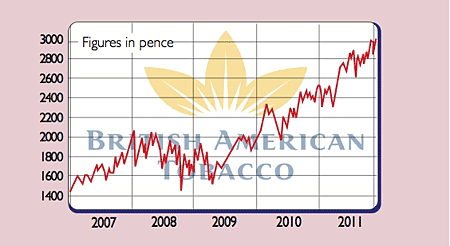
What is it?
British American Tobacco (BAT) is one of the world’s largest tobacco companies. It produces more than 200 different brands and trades in over 180 markets worldwide. Key labels include Dunhill, Kent, Pall Mall, Lucky Strike, Rothmans and Benson & Hedges. It has 45 cigarette factories in 39 countries and sold 708 billion cigarettes in 2010.
What is its history?
BAT was formed in 1902 as a joint venture between Britain’s Imperial Tobacco Company and the American Tobacco Company. It expanded rapidly across the globe and was selling ten billion cigarettes by 1910, with World War I propelling output to 25 billion by 1915. By the 1930s it had become the leading international tobacco company, but World War II saw it lose several end markets as it rebuilt damaged factories, which battered profits.
During the second half of the century it diversified into paper, cosmetics, food, retailing and financial services. The 1990s saw BAT focus solely on tobacco, with expansion in eastern Europe, the acquisition of American Tobacco and a merger with Rothmans. In recent years the company has built a significant presence in emerging markets. Since 2000, it has been one of the most successful investments in the FTSE 100, returning £15.2bn of cash to shareholders while increasing its market value from £11bn to nearly £60bn.
Who runs it?
Nicandro Durante has been chief executive since March 2011, having previously held the post of chief operating officer.
His basic salary is £1m. Former Pernod Ricard CEO Richard Burrows is chairman. Ben Stevens is finance director.
How is trading?
Trading for the nine months to 30 September saw volumes fall by 0.6% to 523 billion cigarettes, but price increases and growth in emerging markets led to revenues increasing by 7%. The four key global brands of Kent, Dunhill, Pall Mall and Lucky Strike saw volume growth of 8%. A continued focus on reducing costs resulted in a further improvement in profit margins.
What’s the outlook?
BAT’s ability to raise selling prices, combined with a strong presence in emerging markets, means that profits and dividends should grow in the short term. However, the tobacco industry is threatened by the rapid growth of the black market as tobacco taxes rise. Consumers’ incomes also continue to be stretched.
The analysts
Of the 24 analysts surveyed by Bloomberg, 12 say “buy”, ten “hold” and two “sell”. The average price target is 3,117p – 3% above the current share price. Most bullish is Goldman Sachs with a 3,400p price target. Collins Stewart is most bearish with a 2,900p target.
Our view
BAT’s dividend is attractive, but the shares are not good value. They’ve seen big gains in 2011, so buy only if they dip.
The numbers
Stockmarket code: BATS
Share price: 3,016p
Market cap: £59.6bn
Net assets (June 2011): £9.0bn
Net debt (June 2011): £9.3bn
P/E (current year estimate): 14.1x
Yield (prospective): 4.6%
Directors’ dealings
Apart from the usual company share plans, there has been little in the way of director share purchases during the last year.
Finance director Ben Stevens and his wife sold a total of 20,000 shares in October, while chief operating officer John Daly sold 8,550 shares in September. The CEO must hold three times his annual salary in shares. Recent share activity can be seen in the chart above, with the main directors’ shareholdings shown below.
Director and shares held
B Stevens: 123,800
J Daly: 78,128
R Burrows: 10,000